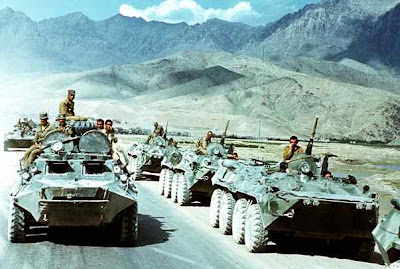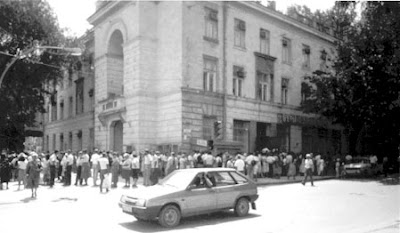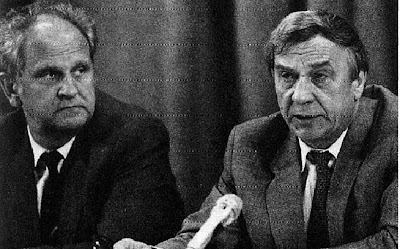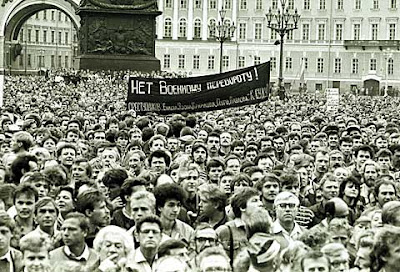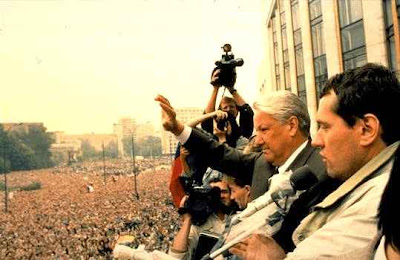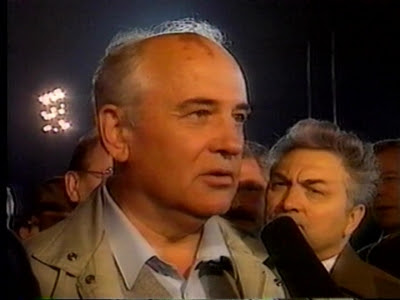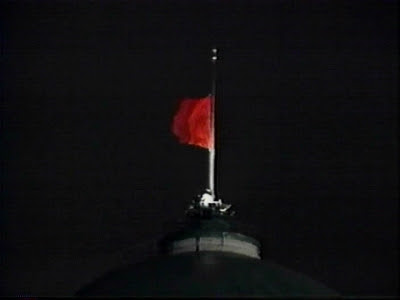No, don't worry, they haven't devalued the ruble again. This one is about my own personal banking crisis of the last week.
It's been a good three months since my last major crisis - the visa debacle of March/April (
part 1,
part 2,
part 3) . And as anyone who has spent time in Russia knows, three months is far too great an interval between personal crises. Thus, I was overdue for something.
But for some reason Russia wasn't cooperating - everything was going quite smoothly. Too smoothly. Doesn't she know she has a responsibility to fulfill? Doesn't she know that I have a responsibility to fulfill? Doesn't she know that I have a vast (ok, maybe that's overstating it) readership that derives the greatest of pleasures from my misfortunes?
And so, it was time to precipitate my own crisis. I don't do these things for myself, since they only bring me heartache, sleepless nights, and an even further receded hairline. I do these things for you, dear readers, so that when you log on during your lunch break in your cushy office you have something entertaining to accompany your turkey & avocado sandwich with baby spinach and herb aioli. I suffer for you, readers!
Actually to be honest, it was an accident, a stupid accident, and no matter how much I love my readers, I would have rather not gone through the experience. But rather than hide my own stupidity, I figure the least I can do is share this as a warning to fellow travelers and as a source of amusement for your turkey sandwich.
So here it is: I left my ATM card in the machine at one of the busiest train stations in Moscow. It was one of those damned machines that gives you your money before returning the card. Not that that's an excuse. My real excuse was that I was in a hurry to get cash for train tickets and ran out of there without grabbing my card or even thinking about it. The kicker is that it was a day and a half before I realized I had lost my card, and when I did the world before my eyes broke into a thousand shards of glass and I watched the pieces fall in slow motion to the ground.
Oh *&$#@. I'm screwed.
The friend whom I was on my way to meet reassured me: "Oh, that happened to us in Vietnam... We left the card in the machine just in time to watch it get sucked back in." Apparently as a security feature, ATMs ingest forgotten cards so that they don't go wandering off with the next customer...
"We called the bank," she said, and they told us that someone would be going out to the machine on Monday to get the card. When we told them we were leaving on Sunday, they said they'd send someone out on Friday and we could get the card at the airport on our way out!" A glimmer of hope from this story raised my spirits, though I had overlooked one minor detail: this was Russia I was dealing with.
I made a b-line for the station. Nobody had turned in the card to the police or the station manager, though I will say that the woman manning the security cameras was very friendly, even sifting through video footage to get clues. Alas, there were none to be had. Finally I returned to the accursed machine and found the customer service number.
After describing my problem with particular eloquence and fluency (apparently my Russian has improved drastically in the last few weeks, or maye it's just stimulated by panic), the woman on the other end of the line assured me that the machine had taken possession of my card and that it was located in the machine at that very moment.
"But unfortunately the machine will only be opened and serviced on the 15th of this month" (this was about a week away). Not looking forward to scratching by for a week on my emergency reserve, I asked if there were any way to expedite the process. After all, this is Russia, a major industrialized nation, not some little communist hangout in Southeast Asia!
She gave me a phone number of the Moscow branch office that would handle it and said I could inquire whether I could get my card sooner.
I called that day, a Saturday (which, unlike in America, is a working day for banks). No answer. I called on Sunday. No answer. I called on Monday. No answer. You see, Tuesday was a national holiday, which means that everyone took Monday off as well. So it wouldn't be until Wednesday that I could actually get through to them, by which time I would be in Yaroslavl for research.
At last Wednesday arrived, and standing on the banks of the Volga I called the number.
Call 1:
"I'm sorry, we don't have it here. Try calling this number, they should know when it will be available."
Call 2, new number:
"No, you need to call this number"
Call 3, new number:
[Disinterestedly and totally unconcerned by my plight]: "No, we don't have it. You should call back in another week to see if it comes in."
"I don't think you understand. I'm a foreigner and I need my card now, I need money. Is there anyone I can talk to about getting it sooner?"
She put me on hold and ten minutes later I hung up in frustration, having been ignored and abandoned.
I called the central customer service number again in despair. My card was somewhere in Moscow but nobody was willing to say when or where it would be liberated and repatriated. To their credit, the customer service people were exceptionally polite and helpful (based on the area code, I determined they're located in St. Petersburg, adding another reason for me to love that city and its residents).
"Yes, I understand everything. Let's check the records... Ah, it seems your card has already been retreived and is located at the central Moscow branch on X street for you to collect. Be sure to bring your passport, and call us if you have any other problems." At last, some light at the end of the tunnel!
Just to be safe, I called the branch and told them that they had my card.
"No, it's not here."
"What do you mean it's not there? I just spoke to your customer service office and they said it's been removed from the machine and taken to your office."
"Well, it's not here. Call back in a couple of days."
By this point I'm furious, as I'm sick of being brushed off by lethargic employees who have no desire to lift a finger beyond their little workspace. My anger and newfound Russian fluency come together all of a sudden in a sort of yin & yang moment and I let loose on the woman:
"Listen, I'm a foreigner and I'm leaving the country in three days." That was a lie, but being honest and nice wasn't getting me anywhere. "I just called your customer service department and they told me that the card has been retreived and that YOU have it at your office. And now you're telling me that you don't have it. So please, tell me, where's my card?"
"Sometimes it takes a couple of days for the technician to deliver the cards that have been left in machines."
Now I'm downright hostile. "Do you mean to tell me that my ATM card is wandering around Moscow right now in the pocket of some technician and that MAYBE it will show up in a couple of days? That's unacceptable. Listen, I need to know right now, WHERE'S MY CARD?"
I hear her call out to a coworker, "Hey, Masha, do you have a card for a last name X?.....You do?" A couple of seconds later, "Yes, it's here. You can come pick it up."
I was too releived and overjoyed to give the woman the tongue-lashing she deserved. If it had been with Masha all along, why didn't she bother to get up and ask her when I first called? At the same time, I felt a little guilty: I had been harsh, I had been brusque, and I had lied. These are all things I rarely do. But this latest incident just proved in my mind again that in this place that's sometimes the only way to get things done, the only way to get someone to take you seriously.
So while I was a little ashamed that I had become "like them," I was also more than a little proud of myself, as I had found the persistence to get the job done and finally had the language skills to back it up. Had this happened a few months ago, I'm sure I would have meekly called back in a few days, surviving on bad kotlety and mashed potatoes in the meantime because I couldn't afford better food.
And yes, the story has a happy ending. I could have put your fears to rest at the beginning, but what would be the fun in that? I went to the Moscow branch yesterday and liberated my card, where it was held in a box with literally hundreds of other abandoned ATM cards.
"I guess this sort of thing happens a lot," I said to the man rummaging through cards.
"Yes, people do this all the time."
Huh. For something that happens all the time, you'd think they'd be a little better equipped to handle these situations...




